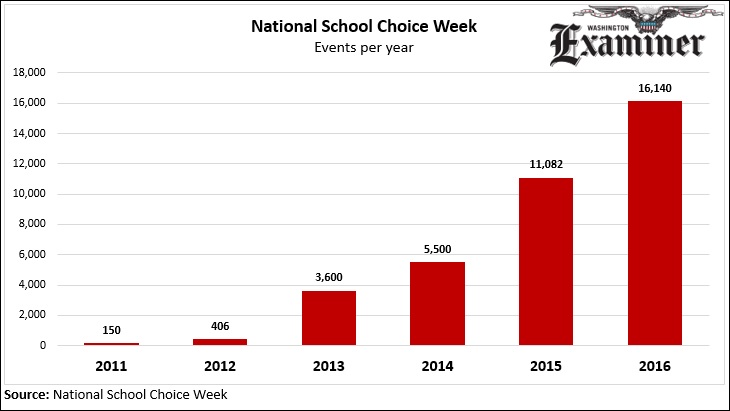By Saturday’s end, millions of people will have celebrated school choice at more than 16,000 events across the country for National School Choice Week. The celebrations all fall under the National School Choice Week brand, but they are independently planned and funded, making the grassroots celebration that much more striking.
“The reason that School Choice Week has grown so exponentially is because people realize that school choice means empowering parents to choose the best education environments for their kids,” Andrew Campanella, president of National School Choice Week, told the Washington Examiner. “It’s not about saying that one type of school is better than another for all kids, it’s about saying that each individual parent should be able to make that determination.” Campanella also credited the positive approach of the celebrations, focusing on presenting all the options and not getting stuck in wonky policy debates.
As it grows, National School Choice Week is becoming increasingly bipartisan. Among the 32 governors issuing proclamations recognizing School Choice Week are three Democrats: John Hickenlooper of Colorado, Jack Markell of Delaware and David Ige of Hawaii. The list of 240 mayors and county leaders recognizing School Choice Week includes many Democrats, including Baltimore Mayor Stephanie Rawlings-Blake, New Orleans Mayor Mitch Landrieu and Washington, D.C. Mayor Muriel Bowser.
The celebration also features a diverse set of partner organizations, like Democrats for Education Reform, the Black Alliance for Educational Options and the Hispanic Council for Reform and Educational Options.
The bipartisan support explains why the United States Senate voted unanimously to recognize National School Choice Week for the second year in a row, with cosponsors including Sen. Cory Booker, D-N.J., and Dianne Feinstein, D-Calif.
“In this year, where we are seeing some of the most contentious and divisive presidential campaigns in decades, it is so important that we have something in this country, an issue that can unite people, that folks can rally around, that is positive,” Campanella said, referencing school choice.
The national celebration began in 2011 with just 150 events across the country. In utilizing individual schools to plan their own events, the movement has been able to show rapid growth. More than 13,000 of the events planned for 2016 are hosted by schools.
The celebration has also expanded to homeschool groups and chambers of commerce. About 800 homeschool groups had events, as did more than 1,000 chambers. “Small businesses understand the importance of ensuring that kids receive a high-quality, personalized, customized education,” Campanella said.
Detractors, such as liberal group People for the American Way, claim National School Choice Week celebrates taking funds from public schools and privatizing education. Not so, says Campanella. He pointed out that four school choice options are within the public education system, including traditional public schools, public magnet schools, public charter schools and online academies. “School choice actually enhances the public education system at providing greater diversity and variety in the public sector options parents have… What’s controversial to me about school choice, is that there are people who oppose it.”
Jason Russell is a commentary writer for the Washington Examiner.

